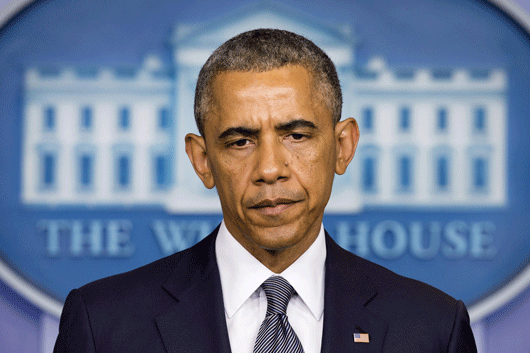
By Patrick Smith
When a U.S. vessel off the coast of Yemen fired on Houthi revolutionaries ... Thursday, it sent another of the Obama administration’s delicate balancing acts in the Middle East off the rails. Is the president who says he’s dedicated to getting the U.S. out of the region’s wars now dragging us into another one before he leaves office?
The U.S. was in an untenable position in the Yemeni conflict even before the U.S.S. Nitze sent cruise missiles into three radar installations controlled by Houthis ... . It has since chided the Saudis from time to time - weakly and ineffectively -- while indirectly supporting their savage and apparently indiscriminate bombing campaign against the Houthi who Riyadh casts (inaccurately) as creatures of the Shia regime in Tehran.
If that sounds like another bowl of noodles, with U.S. interests a tangled mess running every which way, it should because it is. As of Thursday, Obama is certain to serve it, piping hot, to his successor in November.
President Obama reportedly signed off on the missile launches. Here are four reasons he should not have:
• Retaliation was unnecessary. The Pentagon hauled out a lot of boilerplate to explain its response-self-defense, protecting U.S. personnel, freedom of navigation, and global commerce-but it doesn’t match the situation. The missiles fired from Houthi-controlled territory fell well wide of U.S. ships. Given the broader circumstances in all their complexity, there was no justification for a military response.
Strong diplomatic language was the proper tool, considering the Houthis’ relatively primitive military resources. But this appears to be yet another judgment that originated at the Pentagon, not the White House and not the State Department. It’s Defense, we ought to note, that handled all the public relations-and pointedly asserted that it had Obama’s blessing.
• Ignoring the obvious. The Obama administration has ignored for too long Saudi Arabia’s decision to go its own way in the region. This has been increasingly clear for several years-especially since a younger generation has emerged in Riyadh.
The Saudis, don’t forget, were vigorously opposed to the 2003 invasion of Iraq; more recently, there have been major differences over Syria. But the crowning blow was the Iran nuclear deal since Riyadh sees itself as in an existential power struggle with Tehran. It’s plain now that ties between Washington and Riyadh will never again be aligned as they were for many decades.
• The Iran deal is endangered. While Tehran didn’t invent the Houthis, they are an indigenous movement and they are not the proxies of Iran the Saudis make them out to be. The sectarian dimension of the Yemeni conflict is obvious, and yet another big reason the Navy ought to have exercised restraint.
The background here is the deep chasm the Iran nuclear accord has opened in Washington and the increasingly evident animosity between the Pentagon and State. Given Obama’s commitment to the nuclear pact, any move that endangers it is a mistake.
Source: The Fiscal Times, Edited by Website Team